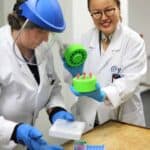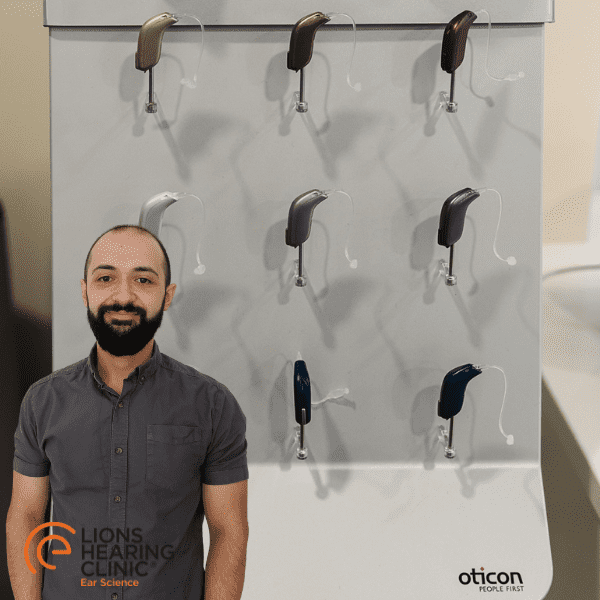Did you know that 60% of all hearing loss can be related to genetics? Causing some people to have more of a predisposition to hearing loss, than others – simply due to their genes.For the 1 billion young people worldwide who already have hearing loss, our researchers are making advances on a potential genetic test for hearing loss, which will impact the way we treat hearing loss in the future.
Hearing loss isn’t something that just happens in old age.
While more than half of people over 60 experience it, the World Health Organisation has warned that more than one billion young people aged between 12 and 25 are at high-risk of noise-induced hearing loss.
“Hearing loss is on the rise in the younger population so it is not just an old-age problem,” explains Kat Penno, audiologist and director of hearing health at Perth-based hearing technology company Nuheara.
“Recreational and occupational noise – things young people listen to, the events they go to and the jobs they are choosing – are all causing hearing loss to start at a younger age.”
According to Lize Coetzee, an audiologist at Lions Hearing Clinic, one in six Australians have hearing loss of varying degrees and there are three main types.
Conductive hearing loss occurs when the entire sound signal cannot pass from the outer ear to the inner ear.
Causes include ear infections, a build-up of wax or damage to the small bones in the middle ear that help you hear.
The second type is sensorineural hearing loss, which Ms Coetzee says is the most common.
It is caused by damage to the tiny hair cells inside the cochlea or to the fibres of the auditory nerve.
Ms Coetzee says they can be damaged by noise exposure or it can happen naturally with age.
The third type is mixed hearing loss, which occurs when people have both of those types. For example, a person who has worked in a loud factory for years but who also has an ear infection.
Ms Penno advises anyone between the ages of 40 and 45 to get their hearing checked at least once a year, even if they don’t think they have a problem.
This is because people don’t always realise what they should be able to hear.
Research suggests most people wait between seven and 10 years before they seek help, she notes.
“If you fell over and broke your leg you’d do something about it straight away but hearing loss is the invisible issue,” adds Ms Penno.
She says delaying getting help can impact on mental health.
Study upon study has shown a link between hearing loss and depression
Ms Penno says many people who struggle to hear over long periods report feelings of social isolation and loneliness.
“What we have noticed is people start to socially withdraw and avoid events because it is too challenging to follow conversations and so we see those with hearing loss have a higher prevalence of loneliness, depression and anxiety over time,” she explains.
“When you don’t address your hearing loss it places more stress on your brain so your cognitive load is higher and you fatigue quicker.
“Your brain will be working hard to fill in gaps.”
Associate Professor Melanie Ferguson, head of the brain and hearing group at Ear Science Institute Australia, which is based in WA, agrees delaying getting help can impact on mental health.
Half of adults with hearing loss report feelings of isolation, loneliness, anxiety or depression mainly because it compromises their ability to communicate and causes social and emotional distress.
People with untreated hearing loss are also at higher risk of developing dementia, reveals Ms Ferguson.
“If you have a problem with hearing, chances are your well-being and your quality of life are suffering,” she explains.
“Hearing loss affects all aspects of our daily life, and because it’s invisible, people just ignore it, often choosing to just ‘live’ with it.”
Hearing loss in children can impair their speech and language development and impact on their ability to learn in the classroom.
“Diagnosis and early treatment is critical,” adds Ms Ferguson, “because there is so much evidence associated with the impact on people’s overall health and wellbeing… from birth through to our senior years.”
Hearing loss is estimated to cost the WA economy more than $1 billion every year, says professor Rob Eikelboom, who manages the brain and hearing group at the Ear Science Institute Australia.
However, the Institute, a not-for-profit global leader in improving the lives of people with ear and hearing disorders, has been conducting world-class research into the risks, treatments and potential cures for hearing loss since opening in Subiaco in 2001.
“We are making advances on a potential genetic test for hearing loss which will impact on the way we diagnose and treat hearing loss in the future,” says Prof Eikelboom.
Remarkably, the Institute’s lab is also one of just two in the world that can convert ordinary human skin cells into the tiny hair cells of the hearing nerve.
This creates the potential to test genes, drugs and interventions in the lab so that hearing loss can eventually be cured, explains Dr Elaine Wong, a senior research fellow at the Institute.
What’s more, scientists at the Institute were also the first in the world to develop an artificial eardrum which is changing the way clinicians treat chronic ear infections, according to research and development manager Dr Filippo Valente.
“Imagine a hearing test that also detects early signs of dementia or a hearing device that tells the user to practice wearing it so their brain can get used to the new amplified sound,” adds Sandra Bellekom, the Institute’s CEO.
“These are just some of the technologies Ear Science is developing right here in WA.”
Personalised hearing technology is gaining pace in the global field of hearing health and Australian company Nuheara is leading the way, says Kat Penno.
For people whose hearing loss is not severe enough to warrant a hearing aid, Nuheara developed wireless earbuds as a convenient and cost-effective option for people with mild to moderate symptoms.
Wearers can tailor their hearing options to their environment because the buds link seamlessly to an app on their mobile phone.
They can opt to cancel noise, amplify sound, enhance conversations or suppress external noise depending on what they are doing and where they are.
The system also offers hearing tests, which people can do regularly at any place and time that suits them, that are of the same quality a professional audiologist would perform in their clinic.
“Nuheara’s buds and app mean managing your hearing health journey is at your fingertips without the need to visit a hearing specialist,” explains Ms Penno.
“You can do your annual hearing profile within our app and track it over time and if anything looks amiss, we will recommend you go in and get it checked.”
“It’s about personalised hearing and utilising digital tools to flip the traditional model so that hearing health is accessible to more people.”
For Rachel Chisholm, 45, a human resources manager at a mining company in WA, wireless earbuds helped her hear better.
Ms Chisholm says hearing aid devices have changed her life for the better.
Ms Chisholm says hearing aid devices have changed her life for the better. Credit: Danella Bevis/The West Australian
I have struggled to hear from a very young age but it wasn’t until my mid-twenties that I was diagnosed with hearing loss.
I was working in the mining industry and one of the requirements was a medical assessment which included an audiological test.
That’s when I was officially diagnosed with hearing loss.
Looking back, friends and family would often ask me to tone down my voice because I’d be yelling instead of speaking. I’d not realised I was talking so loudly.
I nearly walked out in front of cars a couple of times because I just didn’t hear them coming.
I also missed out on a lot of banter with friends because I just couldn’t pick up on what they were saying so I’d pretend to be able to hear and just smile and nod, which actually felt a bit embarrassing.
I love to exercise but even running was dangerous because I could not hear my surroundings and cyclists coming up from behind.
When my brother told me about the Nuheara earbuds, I bought a pair and they have made such a huge difference to my life.
When you do your hearing test through the app, it sets up your hearing buds for your own hearing needs and they synch to your environment.
My earbuds have settings for the gym where speech is enhanced so I can hear the friend I am working out with.
I have a setting for running outdoors which lets the environmental noise in so I can hear cyclists and cars but only a little bit of speech.
I just tap on the setting I want depending on what I am doing.
Having my hearing checked and doing something about it has transformed my life.
I used to avoid going out to places like pubs but now I can hear people clearly and feel included.






